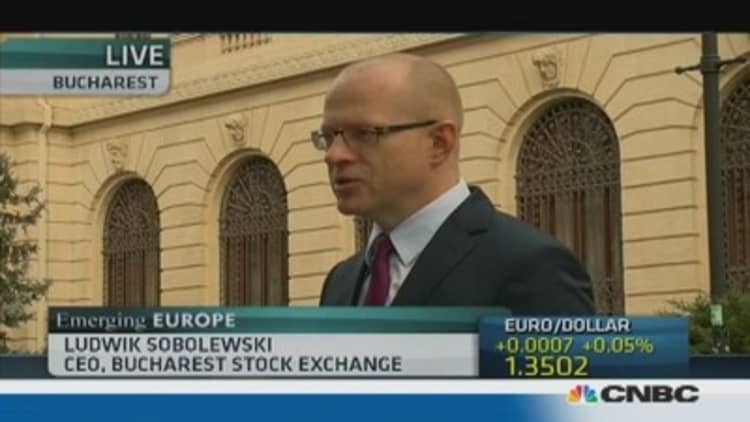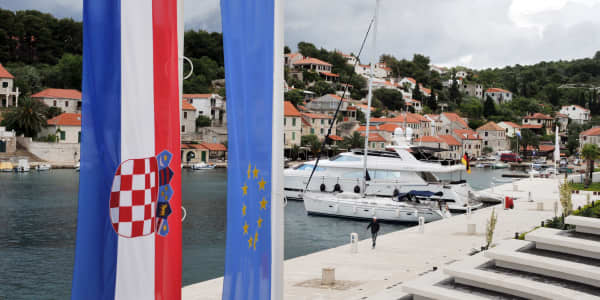
Romania's economy is seeing the best growth in the entire European Union (EU) and the country is ready to join the euro zone, the country's Prime Minister Victor Ponta told CNBC on Monday, despite concerns that corruption and lack of structural reform are still holding the country back.
Romania is keen to cooperate with reform agendas demanded by international lenders, which have supported the country through the financial crisis. It hopes to join the single currency, despite the euro area's currently unappealing growth prospects.
Speaking to CNBC in Bucharest, Prime Minister Victor Ponta said his country had to be "absolutely prepared to join the euro zone in terms of economic figures, inflation and the labor force."
"I think that the euro zone does not need another weak player so that's why we must, first of all, prepare ourselves. But the political commitment is to join the euro zone and I think that would be in the benefit of Romania but also the rest of the countries in the EU."
Once known as the "tiger" of Eastern Europe, Romania has seen something of an economic renaissance as more developed markets in Europe struggle through recession.
Indeed, Romania's economy grew at its fastest pace in two years in the third quarter of 2013, growing 1.6 percent quarter on quarter. In comparison, the 28-country European Union grew 0.2 percent, and the euro zone slowed to 0.1 percent in the same quarter.
The country has gone on a long political and economic journey since 1989 when the iron curtain of Communism was lifted in Eastern Europe and Romania's dictator, Nicolae Ceausescu, met a grisly end after 24 years of erratic and autocratic rule when he was shot by a firing squad.
In 2007, Romania joined the EU along with its neighbor Bulgaria and experienced strong pre-crisis growth. Like its European neighbors, however, it suffered when the financial crisis hit and has had three loans from the International Monetary Fund (IMF) and other international lenders since 2009, the latest of which was agreed to at the start of November.
(Read more: Eastern Europe: The next vacation hotspot?)
Early November the government agreed to a 2014 budget plan with the IMF and European Commission under the latest aid deal – worth 4 billion euros ($5.4 billion) – in which it will introduce new taxes but also a minimum wage, as part of agreed reforms.
Ponta said that his country was "absolutely out of the markets" in 2009 and 2010 until the IMF and the European Commission agreed to help it and that, now, issues of government bonds were five times over-subscribed.
The country's investor appeal might be increasing but it is still dogged by accusations of entrenched corruption and red tape hampering business growth.

Ponta conceded his country still had some way to go in the process of implementing structural reforms, saying that" Poland is much more advanced than Romania in structural reforms."
(Read more: Where to put your money in emerging Europe)
Ponta said the country expected to see 2.2 percent growth in 2013, growth which had been driven by reforms to the country's energy, automobile and agricultural sectors and on its ability to access European Union funds.
Foreign investors have started taking notice too.
Shares of state-owned natural gas company Romgaz surged when the company debuted on the London and Romanian Stock Exchanges last week and the head of the country's stock exchange, Ludwik Sobolewski, told CNBC the country planned more initial public offerings (IPOs).
(Read more: Poland: Paths of glory or roads to perdition?)
"I'm having a lot of meetings with investors all over the world and there is a growing interest in Romania," Sobolewski told CNBC on Monday. "We have interesting assets here and the example of Romgaz shows that the interest is real. Investors want to invest in good, Romanian assets."
"There is a growing number of available investment funds here in Romania too and this is fundamentally important for the growing in the future of the Romanian economy and capital markets."
He added, however, that Romania's capital markets were underdeveloped and needed to be more "open and friendly" to international and domestic participants.
- By CNBC's Holly Ellyatt, follow her on Twitter @HollyEllyatt





